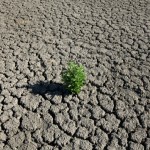4 Ways to Answer Skeptics on Climate Change
How do you convince people climate change is real? The answer until now has largely been one of science, data and facts. But an emerging voice in the scientific community is taking a different tack: emphasizing religious stewardship over statistics, and advocating awareness of climate change as a spiritual responsibility.
One emerging voice of the faith-inclined climate change community is climatologist Katharine Hayhoe, who also happens to be an evangelical Christian. Hers is a fascinating tactic, especially considering that only slightly more than half of white evangelicals believe in climate change, less than other denominations, according to a recent poll by the Public Religion Research Institute. The poll also found that white evangelicals are significantly less likely than other religious persuasions to believe climate change is caused by humans. Hayhoe is a professor at Texas Tech in Lubbock.
The spiritual scientist wrote a list of ways to engage evangelicals on the subject of climate change for Science & Religion Today:
- You don’t have to agree on everything. Hayhoe says that “many erroneously believe that it’s necessary to agree on evolution and an old Earth in order to agree on climate change.” She counters that mankind has only been having a massive impact on the climate since the Industrial Revolution 400 years ago. “By separating these issues from each other,” she writes “it’s possible for people who disagree on creation and evolution to agree on climate.”
- The facts are all around you. Hayhoe suggests that instead of only looking at global and historical data of climate change, skeptics start looking in their own yards: “trees and plants flowering earlier in the year, birds migrating southward later, insects and invasive species moving northward.” Some of the best evidence indicating a warming planet is right before our eyes, she says.
- This isn’t just another cycle. There is no natural factor or cycle of the sun to fault for climate change, Hayhoe says. “There is no natural explanation for the change we see today,” she writes. “According to natural factors, we should be cooling.”
- What would Jesus do on a warming planet? That’s easy, Hayhoe says. Jesus “told us to love our neighbor as ourselves; and today, it’s our global neighbors—the poor and needy, the disadvantaged and hopeless—who are already being affected by climate change,” she writes. Natural disasters, rising seas and extreme temperatures are affecting (and taking) life across the globe, she says. “To ignore their cries and cast scorn on those who attempt to draw our attention to their plight is not a response of love; it is acting out of fear, and God is not the author of fear,” she writes.

